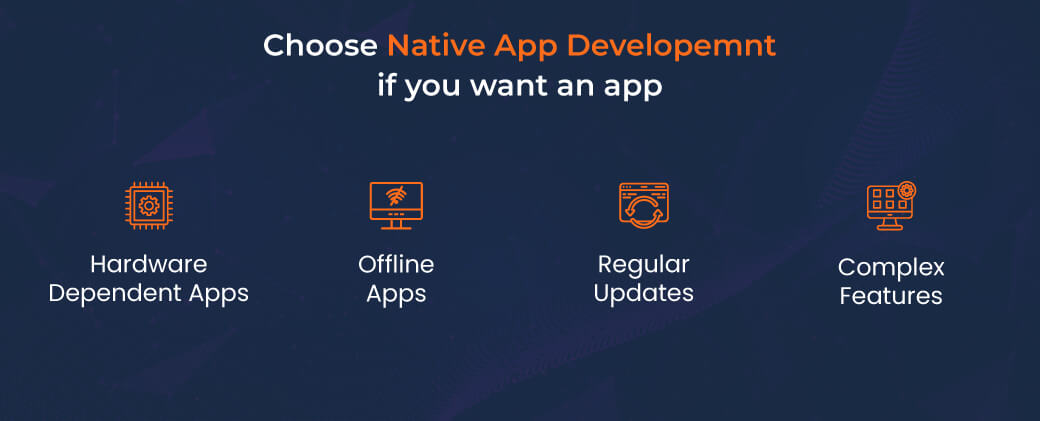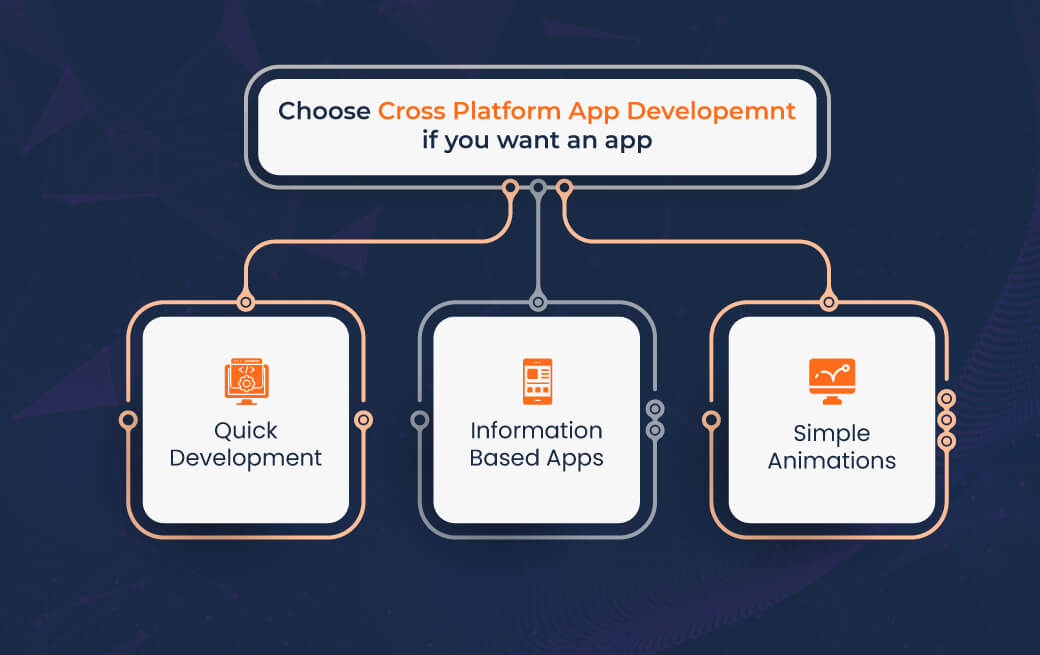The increasing ratio of mobile devices to website traffic has increased the demand for mobile applications more than ever. As a result, investing in such a solution could be a significant step forward. But which technology should you use to ensure the quality, security, and performance of your product? Taking deliberate actions at the outset of this journey can help your company succeed from the start and save you money.
Native vs Cross-platform: both of these technologies are well-developed and viable, so choosing between native and cross-platform may not be so simple. However, each has unique characteristics that may apply to a variety of needs and expectations, so individual needs and the scope of your project are critical considerations. Depending on your budget, planned app features, app purpose, and target audience, one development process may be preferable to another. But which one?
Let's take a closer look at the key distinctions between native and cross-platform mobile app development, as well as the benefits & drawbacks of each, to determine which is most suited to the goals of your project.
What is Native App development?
Native app development involves creating mobile applications specifically tailored for a particular operating system (OS), such as iOS or Android. Developed using platform-specific languages like Swift or Objective-C for iOS and Java or Kotlin for Android, native apps are optimized for performance and seamlessly integrate with device features like the camera or GPS.
Pros and Cons of Native App Development
Pros of Native App Development
When it comes to native vs cross-platform frameworks, it is crucial to thoroughly understand the advantages and disadvantages of each. Let's begin by examining the pros and cons of native applications.
1. High Performance: Native applications excel at delivering outstanding speed, responsiveness, and operational efficiency. This is achieved by programming these platform-specific apps using fundamental programming languages and APIs. Additionally, they can fully harness the processing speed of the device, leading to reduced load times.
2. Extensive Functionality: As previously emphasized, a primary advantage of native development over cross-platform development is its capacity to utilize all features inherent to the specific platform. This results in swiffer execution and an enhanced user experience. Notably, native apps are adept at functioning seamlessly even in the absence of internet connectivity, making them an optimal choice for intricate mobile applications.
3. Ultimate UI/UX: To create apps with robust and intuitive user experiences, along with a consistent look and feel, native technology stands out. Developed using native software development kits (SDKs) and tailored for a specific operating system, native mobile apps provide users with a more natural and seamless interaction.
4. Higher Security and Reliability: Native apps have a greater chance to prevent security breaches than cross-platform apps. How? Native apps are programmed in the platform's core language, making them more safe and stable. Furthermore, native vs cross platform mobile app development features like proactive security upgrades, multi-factor authentication, and remote management capabilities offer the highest level of data protection and privacy.
5. Store’s Support: Launching native apps in app stores is streamlined due to automatic compliance with iOS and Android guidelines. Both Google and Apple favor native apps, featuring them prominently. Securing a spot in an app store not only simplifies the process but also serves as significant brand reinforcement. Being featured in app stores provides a quantum leap in downloads, enhancing visibility and user engagement.
Cons of Native App Development
1. High Price: The most significant drawback of Native app development is its high cost. There are two main reasons for this high cost. First, since native app development is hard, professional development and support consume the majority of the project budget. It should be noted that native mobile developers are more expensive than cross-platform developers. Second, in order to serve two unique audiences, i.e., Android and iOS, two distinct native apps are required, resulting in the setup of two development teams as well as an increase in total cost.
2. Difficulties with Updates and maintenance: It is difficult to maintain separate builds for different platforms that require constant maintenance and support. It may be hard to collaborate with multiple teams or to push out feature updates or new features.
3. Slow development speed: Another drawback of mobile native app vs cross platform apps is the speed of development. A native app takes substantially longer to develop than its cross-platform version. There's also no way to reuse native code from one operating system for another, which means slower development.
What is Cross-platform App Development?
Cross-platform app development involves creating mobile applications that can run on multiple operating systems using a single codebase. Unlike native development, which requires separate coding for each platform, cross-platform development utilizes frameworks and tools that enable developers to write code once and deploy it across various platforms, like iOS and Android.
Pros and Cons of Cross platform App development
Similar to their native counterparts, cross-platform applications come with their own unique set of advantages and drawbacks. Let's delve into these aspects to gain insights and make informed decisions.
Pros of Cross platform App Development
1. Cost-Effective
Emphasizing the 'write once, run everywhere' principle, cross-platform app development uses a singular codebase across multiple platforms, substantially reducing development costs. This approach facilitates the deployment of a unified development team to create a single app that is deployable across various app stores.
The cost-effectiveness inherent in cross-platform development becomes a pivotal factor when weighing the decision between cross-platform and native apps
2. Quick Development
Cross-platform development allows for the reuse of approximately 50–80% of the initial codebase, leading to substantial time savings compared to building code from the ground up. The native vs cross platform efficiency enables a quicker development process, allowing for the rapid launch of fully functional, feature-rich business apps.
3. Easy App Support & Maintenance
In the current landscape of frequent mobile app updates, maintenance can strain resources. Here, cross-platform development gains an advantage. Managing regular maintenance and support becomes streamlined and uncomplicated compared to native apps. With a unified codebase, the team can efficiently implement updates and introduce new features or patches across multiple platforms simultaneously.
4. Faster time to Market
Efficient development means a shorter time to market. Cross-platform expeditiously manages tasks from app launch to introducing new features for both iOS and Android audiences, ensuring a swift and comprehensive process.
Cons of Cross-platform App Development
1. Limited Functionality
In terms of functionality, cross-platform applications exhibit limitations, including restricted access to operating system features, no native API accessibility, and dependency on an internet connection. These factors collectively impact the overall user experience of the app.
2. Limited support of 3rd- party Libraries
The cross-platform development framework faces challenges in compatibility with various 3rd-party libraries and software development kits (SDKs). This necessitates that developers dedicate substantial productive hours to finding alternative solutions for seamlessly integrating the desired functionalities into the app, adding a layer of complexity to the development process.
3. Integration issues
Integration problems often arise in cross-platform apps due to their one-size-fits-all approach. When integrating with local settings, it's common to observe a lack of seamless integration with the target operating system, leading to potential app failures and operational issues.
Main Differences Between Native vs Cross-Platform Apps
Now equipped with a detailed understanding of each framework, let's briefly compare cross-platform and native apps to discern their key distinctions.
| Parameters | Native App | Cross Platform App |
|---|---|---|
| App Performance & Speed | Native Apps excel in performance—fast, responsive, and less prone to crashes. | Performance difficulties are common in cross-platform apps and it is significantly slower than native apps. |
| App Development & Maintenance Cost | High development costs since building several apps is required if you want to distribute your products or services across multiple platforms. Maintenance is both time-consuming and expensive. | Both development and maintenance are fairly cheap. |
| Development Time | It is lengthy since codes must be built from scratch for each platform. | Low, as a single code, it can be used on various platforms. |
| Time to Market | It is lengthy since two apps must be developed, which may take some time. | The ability to reuse code reduces the time it takes to run the application. |
| User experience | Provides a great user experience as a result of high speed, better performance, better graphics, and optimal utilization of the device's features. | Relatively low since developers and designers strain to meet all of the UX requirements of numerous platforms in a single app. Furthermore, attempts to improve UX frequently impede speed. |
| Language Compatibility | Native apps are created in platform-specific programming languages. Objective-C and Swift for iOS, for example, and Java or Kotlin for Android. | Cross-platform apps are developed in Javascript, dart etc..which are compatible with various platforms. |
| Programming Expertise | Native developer abilities are typically more expensive and difficult to gain. | Since most cross-platform frameworks are web-based, the required expertise is easy to find. |
| Authorization for the App Store and Google Play | Easy | It takes time to authorize these applications on the App Store or Google Play. Furthermore, each update is separately authorized before it is made accessible for usage. |
| Dependency | It is less reliant on other open-source libraries or platforms. | Quite reliant on many libraries and tools. |
| The availability of third-party SDKs | Outstanding | Average |
| UI Reliability | Consistent with the device's UI components | There is a lack of uniformity. |
| Team Size | Large (separate teams for each platform) | Medium to small (all platforms are served by a single team) |
| Tools | Java, Kotlin | React Native, Flutter, and Xamarin |
| Examples | Bloomberg |
How Do You Choose the Right Choice for Your Business?
After considering the advantages and drawbacks of both Native vs cross platform mobile app development technologies, making a final decision for your business may not be a daunting task. In my view, the choice should be guided by the specific requirements of your project, the time frame, and the budget.
However, there are additional considerations to streamline your decision-making process. We've included an illustration to assist you decide whether native or cross-platform development is best for you.


Conclusion
Are you feeling overwhelmed by the task of selecting the ideal technology for your app? Release your concerns and rely on the expertise of our seasoned web developers at Sparkout. We understand that each business confronts distinctive challenges with specific requirements. That's why our services encompass a range of technologies, both native and cross-platform, ensuring the creation of a perfect mobile application perfectly suited to your enterprise.
 Translate
Translate


















Author Bio
Praveen Kumar
Technical Architect
At Sparkout Tech Solutions, we believe in the power of collaboration. I take pride in fostering a team culture that encourages open communication, knowledge sharing, and continuous learning. In the ever-evolving tech landscape, I am committed to staying at the forefront of industry trends. This commitment allows us to deliver solutions that not only meet but exceed our clients' expectations